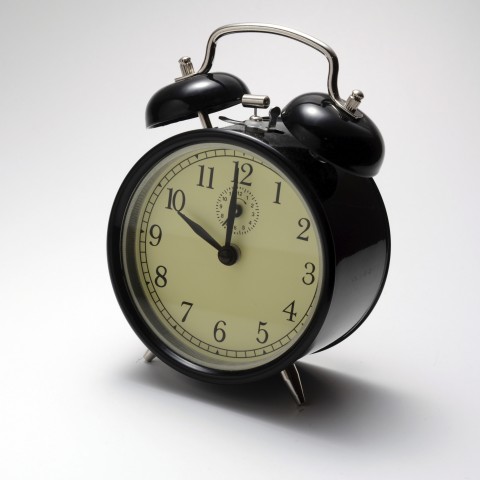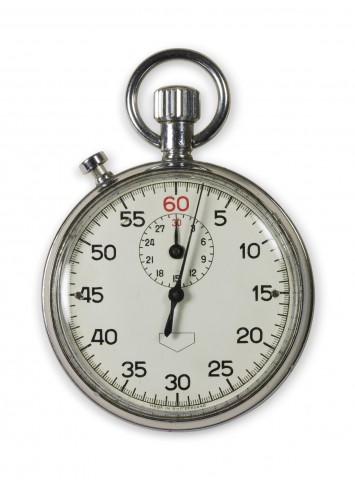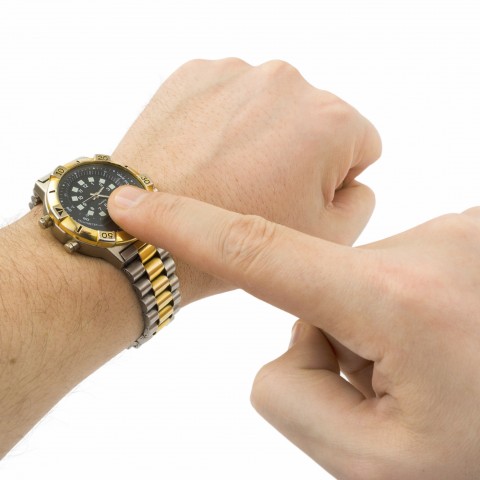
What time is it in Poland right now? Depending on your time zone, you may have to add or subtract hours to find this out, because this Eastern European country is in the GMT+2 time zone.
Knowing the time in Poland allows you to be punctual for meetings and events, but to communicate effectively, you also need to know how to tell the time in Polish. Fortunately for you, we’ve prepared this resource to help you learn everything you need to know about it.
 Table of Contents
Table of Contents
- Asking for the Time in Polish
- Hours in Polish
- Minutes in Polish
- Polish Clock Time: “Half” and “Quarter”
- General Time References
- Adverbs of Time
- Idiomatic Expressions, Proverbs, and Sayings
- Final Thoughts
1. Asking for the Time in Polish

When you live in Poland or visit the country for a holiday or vacation, you may be approached by a stranger asking you for the time. You don’t want to be caught off-guard in this situation. Here’s some indispensable vocabulary to help you know when someone is asking you for the time—or when you want to know the current time in Polish yourself!
- Która godzina?
While this is the most common expression to ask about the time, godzina actually means “hour.” The word for “time” in Polish is czas.
- Przepraszam, czy wiesz która jest godzina?
“Excuse me, do you know what time it is?” [Informal]
In the informal context, we use the second person singular of the verb wiedzieć (“to know”), which is wiesz (“you know”).
- Przepraszam Panią, czy wie Pani, która jest godzina?
“Excuse me, do you know what time it is?” [Formal, to a woman]
In the formal context, we use the third person singular of the same verb (wie – “he/she/it knows”) with the right form of the noun Pani (“Ma’am”) when dealing with a woman or Pan (“Sir”) when dealing with a man:
- Przepraszam Pana, czy wie Pan, która jest godzina?
“Excuse me, do you know what time it is?”
There’s also another Polish expression used to ask about time: Czy masz zegarek? It translates literally as “Do you have a watch?” Remember that there’s a difference between the word “watch” (zegarek) and “clock” in Polish (zegar).
Sometimes you have to ask about the time in a specific context, such as when you want to know what time an event or a meeting will take place. It’s important to be on time in Poland, and especially important not to be late for work as Polish people are pretty strict about it.
- O której jest…?
“What time is…?”
…spotkanie?
“…the meeting?”
…Twoja randka?
“…your date?”
…impreza?
“…the party?”
How do you tell someone the current time or the time of an event that’s yet to come? You’ll find out in the next section. If you’d like to know survival phrases related to time, such as “What time does the museum open?“, spend some time exploring PolishPod101.
2. Hours in Polish

Although in Polish, both the twelve-hour clock and the twenty-four-hour clock are used, the twenty-four-hour clock is preferred in formal communication. Let’s first focus on the twelve-hour clock, which is used in many English-speaking countries.
1- Twelve-hour Clock
Does six o’clock mean six o’clock in the morning in Polish, or in the evening? As you can see, using the twelve-hour clock may cause confusion. This is why, when the context isn’t clear, you should clarify what time of day you mean by adding certain expressions, similar to A.M. and P.M. in English:
- Dwunasta
“12 o’clock”
- Dwunasta w nocy / Północ
“Twelve at night” / “Midnight”
- Dwunasta w południe / Południe
“12 P.M.” / “Midday” / “Noon”
Both “midnight” and “midday” are an exception to the rule, but otherwise, the way to say A.M. and P.M. in Polish is predictable.
- Pierwsza
“1 o’clock”
- Pierwsza rano
“1 A.M.“
- Pierwsza po południu
“1 P.M.“
The next hours follow the same pattern as “1 o’clock.” So to express “A.M.,” we add rano after the name of the hour; to express “P.M.,” we add po południu.
- Druga
“2 o’clock”
- Trzecia
“3 o’clock”
- Czwarta
“4 o’clock”
- Piąta
“5 o’clock”
From six P.M. onwards, you don’t say szósta po południu, but szósta wieczorem meaning “6 in the evening”:
- Szósta
“6 o’clock”
- Szósta wieczorem
“6 P.M.”
The pattern of saying “in the evening” in Polish continues for the remaining hours:
- Siódma
“7 o’clock”
- Ósma
“8 o’clock”
- Dziewiąta
“9 o’clock”
- Dziesiąta
“10 o’clock”
- Jedenasta
“11 o’clock”
How do you use them in a sentence? It’s very simple. Have a look:
- Która jest godzina w Polsce?
“What is the time in Poland?”
- Jest jedenasta rano.
“It’s 11 A.M.”
- Jest ósma wieczorem.
“It’s 8 P.M.”
In other words, we simply use the conjugated verb jest and add the hour with or without the indicator for A.M./P.M. Just like in English, in Polish, people often use numbers instead of full written words (e.g. for “7 A.M.” they’d write 7 rano instead of siódma rano).
2- Twenty-four-hour clock

Talking about the time using the twenty-four-hour clock is much simpler. It’s also less confusing as there are twenty-four hours in a day. When you name one of these hours, there’s no doubt what you mean:
- Która godzina?
“What time is it?”
- Jest…
“It’s…”
…północ – 00:00 – “midnight”
…pierwsza – 01:00 – “…1 A.M.”
…druga – 02:00 – “…2 A.M.”
…trzecia – 03:00 – “…3 A.M.”
…czwarta – 04:00 – “…4 A.M.”
…piąta – 05:00 – “…5 A.M.”
…szósta – 06:00 – “…6 A.M.”
…siódma – 07:00 – “…7 A.M.”
…ósma – 08:00 – “8 A.M.”
…dziewiąta – 09:00 – “9 A.M.”
…dziesiąta – 10:00 – “10 A.M.”
…jedenasta – 11:00 – “11 A.M.”
…dwunasta – 12:00 – “12 P.M.”
…trzynasta – 13:00 – “1 P.M.”
…czternasta – 14:00 – “2 P.M.”
…piętnasta – 15:00 – “3 P.M.”
…szesnasta – 16:00 – “4 P.M.”
…siedemnasta – 17:00 – “5 P.M.”
…osiemnasta – 18:00 – “6 P.M.”
…dziewiętnasta – 19:00 – “7 P.M.”
…dwudziesta – 20:00 – “8 P.M.”
…dwudziesta pierwsza – 21:00 – “9 P.M.”
…dwudziesta druga – 22:00 – “10 P.M.”
…dwudziesta trzecia – 23:00 – “11 P.M.”
…dwudziesta czwarta – 24:00 – “12 A.M.”
The last expression is only acceptable in speech. In writing, you’d use the word at the beginning of the list: północ for “midnight.”
3- Useful Expressions
Here’s a handful of useful expressions and examples of how to use them, so that you can do a bit more than just saying the time in Polish.
- Jest już piąta po południu.
“It’s already 5 o’clock!”
- Nie ma jeszcze czwartej.
“It’s not 4 o’clock (yet).”
- Już prawie dwudziesta pierwsza.
“It’s almost 9 P.M.”
3. Minutes in Polish

“A minute” in Polish is minuta. Using the hours and minutes together will allow you to give someone the exact time in Polish.
Let’s look at how to write time in Polish a few different ways:
- Jest…
“It’s…”
…11.38
…11:38
…1138
…1138
If you don’t know the numbers in Polish well yet, study the numbers from 1-10 and 11-10:
- Jest jedenasta trzydzieści osiem.
“It’s eleven thirty-eight.”
That reminds me of one special way of telling time in Poland. Since 1936, a “speaking clock” (zegarynka) has been telling time in Polish to everyone who calls a special number (19226).
1- Using “Past” and “To” with Minutes
It’s useful to know how to use “past” (po) and “to” (za) when telling the time in Polish. The following examples show you how to use these words while answering the question: “What’s the current time in Poland?”:
- Jest dwanaście po trzeciej.
“It’s 12 past 3.”
- Jest dwadzieścia dwie po drugiej.
“It’s 22 past 2.”
Are you wondering why you see the word trzeciej instead of trzecia, and drugiej instead of druga? This is because nouns in Polish have cases. You can find out more about them by visiting the lesson Painless Polish Grammar.
After “half past,” we start to use “to” (za):
- Jest za dwadzieścia dwunasta.
“It’s 20 to 12.”
If we were to translate it literally, it’d be “It’s in 20 (minutes) 12.” It makes no sense in English, but shows you that the structure of how to say time in Polish with za and minutes is:
Za (“to”) + number of minutes “missing” + the upcoming hour
Here’s another example:
- Jest za pięć ósma.
“It’s 5 to 8.” (Or in literal translation “It’s in 5 [minutes] 8.”)
Did you notice that there’s no need to say what time of day it is? It’s because with conversations about the exact time, the context is almost certainly understandable for both speakers.
2- Useful Expressions with “Minute”
“A minute” in Polish, just like in English, is used in a number of idiomatic expressions. You’ll find them below:
- Potrzebna mi jeszcze minutka.
“I need one more minute.”
- Czy masz minutę?
“Do you have a minute?”
Another way of saying the same thing is Czy masz chwilę? (“Do you have a spare moment?”)
- Zabierze Ci to dwie minuty.
“It’ll take you two minutes.”
4. Polish Clock Time: “Half” and “Quarter”

To become a pro in telling time in Polish, you need to acquire skills to talk about “halves” and “quarters.”
1- Quarter Past and To
The good news is that you already know how to say:
- Jest dziewiąta piętnaście.
“It’s 9:15.”
- Jest piętnaście po trzeciej.
“It’s 15 past 3.”
- Jest za piętnaście czwarta.
“It’s 15 to 4.”
You can express the same idea by mentioning a “quarter” (kwadrans):
- Jest kwadrans po drugiej.
“It’s a quarter past two.”
- Jest za kwadrans dwunasta.
“It’s a quarter to 12.”
That wasn’t too difficult, was it? I have no idea why the BBC in the article 10 Facts about the Polish Language claims it’s one of the most difficult languages in the world to learn…
2- Half Past and To
You also already know how to say “half past.” We covered this topic earlier on, but here’s a reminder on how to answer the question “What is the time in Poland?”:
- Jest trzynasta trzydzieści.
“It’s 13:30.”
It’s also possible to say that thirty minutes are “missing” before a certain hour. In English there’s no such thing, but try to think about it as “half to.” To say “It’s 13:30” in this manner, you’d say:
- Jest w pół do drugiej.
Literally: “It’s half to two.”
After jest, you need to add w pół do (“half to”) and the hour that’s about to come. Have a look at another example:
- Jest w pół do czwartej.
“It’s half past three.” (Literally: “It’s half to four.”)
I know it’s a new idea, but with some practice you’ll get the hang of it!
5. General Time References

You already know that to say A.M. in Polish, we add rano to the hour. You also know that to say P.M. in Polish, we use po południu until five o’clock, and wieczorem from six o’clock onwards. There are also other time references that are useful when you’re trying to learn time in Polish:
| wcześnie rano | “early in the morning“ |
| wschód Słońca | “sunrise” |
| wczesne popołudnie | “early in the afternoon“ |
| zachód Słońca | “sunset” |
Here you can see the above-mentioned expressions used in sentences:
- Wstaję wcześnie rano.
“I wake up early in the morning.”
- Oglądam wschód Słońca.
“I watch the sunrise.” Noqw Poland. For instance, in the morning, you should greet people by saying Dzień Dobry (“Good morning”) and in the evening you say Dobry wieczór (“Good evening”).
Would you like to learn more about this topic? Check out the lessons Saying Hello No Matter the Time of Day in Polish and Polish Farewells on PolishPod101.
1- Weeks, Months, and Years
You know how to talk about specific parts of the day and how to answer the question “What time is it in Poland?”, but you should also learn other expressions referring to longer periods of time:
tydzień — “week”
- Tydzień to 7 dni.
“A week is 7 days.”
miesiąc — “month”
- Miesiąc to 30 lub 31 dni.
“A month is 30 or 31 days.”
rok — “year”
- Rok to 12 miesięcy.
“A year is 12 months.”
Knowing how to tell time in Polish and how to ask for it are important skills, but it’s equally important for you to be able to talk about dates. If you don’t know how to do it yet, read our article about reading dates in Polish.
6. Adverbs of Time

Adverbs of time are used to indicate when something happened or how long it lasted. They include the following:
- Mam czas teraz.
“I have time now.”
- Obecnie jestem w Warszawie.
“Currently I’m in Warsaw.”
- Urodzili się w tym samym czasie.
“They were born at the same time.”
- Piję kawę po śniadaniu.
“I drink coffee after breakfast.”
- Jem śniadanie przed pracą.
“I eat breakfast before work.”
- Niedługo skończę.
“I’ll finish soon.”
- Wyjeżdżam na długi czas.
“I’m going away for a long time.”
- Zrób to tak szybko jak to możliwe.
“Do it as soon as possible.”
7. Idiomatic Expressions, Proverbs, and Sayings

You’ve mastered the skills you need to chat about the Polish clock time. Well done! Now, it’s time to learn a number of idiomatic expressions, proverbs, and sayings to enrich your Polish vocabulary.
1- Idiomatic Expressions Related to Time
- Marnujesz czas.
“You’re wasting your time.”
- To strata czasu.
“It’s a waste of time.”
- Nie ma czasu do stracenia.
“There’s no time to waste.”
There are also two Polish equivalents for “It’s high time…” (Najwyższy czas… and Najwyższa pora…):
- Najwyższy czas/Najwyższa pora na naukę polskich przysłów.
“It’s high time to learn Polish proverbs.”
2- Proverbs and Sayings Related to Time

What English proverbs and sayings related to time are also used in Polish? Let’s have a look:
- Czas to pieniądz.
“Time is money.”
- Jak ten czas leci! / Ale ten czas leci!
“Time flies.”
- Czas leczy wszystkie rany.
“Time heals all wounds.”
- Komu w drogę, temu czas.
Roughly translated as “It’s time to go.”
This proverb means that the faster you start doing something, the faster you’ll finish.
- Nie czas żałować róż, gdy płoną lasy.
This proverb translates as “Don’t cry over roses, when the forest is on fire.”
This is a reminder of priorities and the need to focus on the biggest problem first.
8. Final Thoughts
We hope that you’ve enjoyed learning about telling the time in Polish. You’ll have no problems answering the question “What is the time in Poland?”, giving people the exact time in Polish, or asking them about the time if you forget your watch. You’ve also memorized a number of useful expressions related to time.
If you want to become more confident in your Polish skills, get a free account with PolishPod101. It’s an amazing opportunity to practice the language by listening to real life dialogue with native speakers on a platform available 24/7.
Don’t forget to let us know what time it is where you are right now, in Polish. In case you have any questions, don’t be shy. We’re here for you!










